Venus
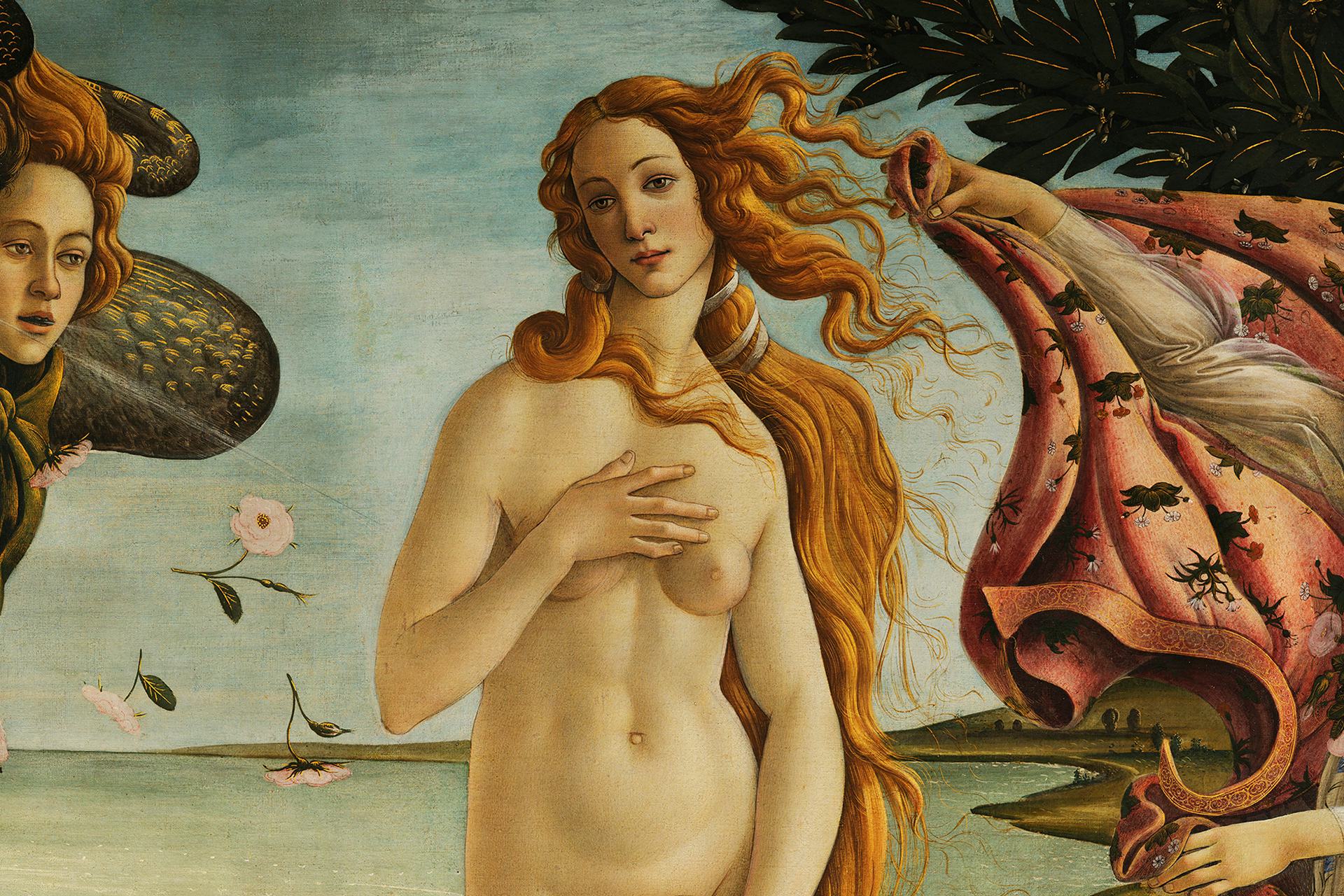
Overview
Venus was the Roman goddess of love, maternal care, sexual reproduction, and erotic desire. The loveliest of all deities, Venus desired—and was desired by—mortals and gods alike. Like the Greek Apollo, Venus had a fluid sexuality and embraced male and female lovers alike. She was also the guardian of lovers and prostitutes, and a major figure in Roman religion. Venus was adapted from the Greek goddess Aphrodite, with whom she shared a mythological tradition.
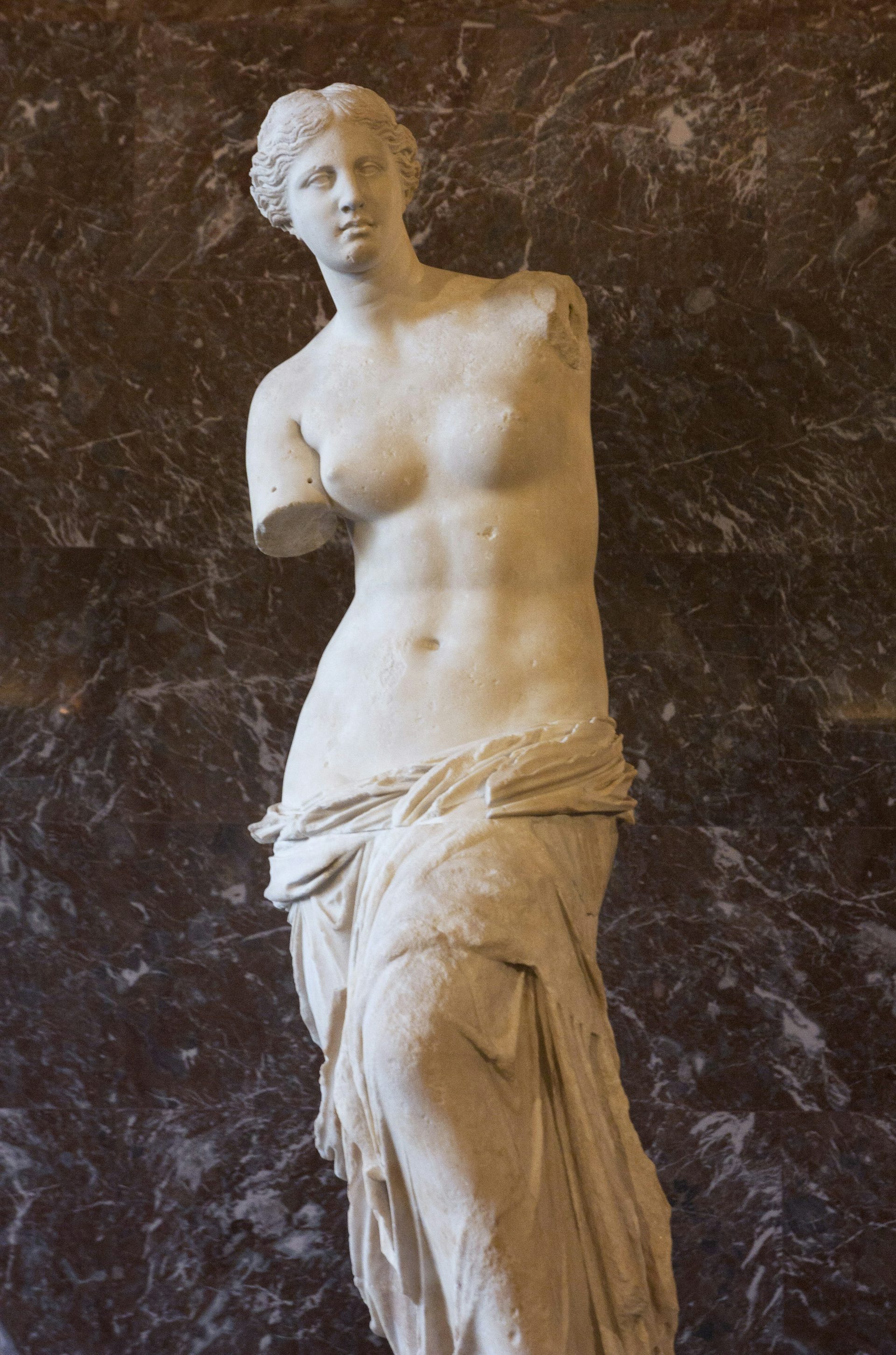
The Venus de Milo, sculpted by Alexandros of Antioch c. 130 BCE. Generally regarded as a masterpiece of the classical era, the Venus de Milo depicts the goddess in an easy, natural pose while still displaying her seductive charm. Lost for centuries, the statue was discovered amidst the ruins of ancient Milos by a Greek peasant. While this statue actually depicts the Roman goddess, the term “venus” is used to describe any nude female figure from the era.
Louvre Museum, Paris, FranceVenus was formally incorporated and adopted into the Roman pantheon in the third century BCE. During the Punic Wars of the second and third centuries BCE, Venus was thought to lend her assistance to the Romans and ensure their victories over the Carthaginians. Her importance as a figure of worship peaked shortly thereafter, though she continued to be venerated until the rise of Christianity in the fourth century CE. Revered for bringing victory to the Romans, Venus was also celebrated as the mother of Aeneas, the ancestor of Romulus, the founder of Rome. In later years, Julius Caesar publicly linked his family’s heritage to the goddess’ maternal line, making Venus the progenitor of the first imperial dynasty.
Etymology
The name “Venus” came directly from the classical Latin noun venus, meaning “love.” This noun was often used to indicate particularly sexual love or desire. It was also directly related to the verb form venerari, meaning “to love or to revere,” also the root of the English word “venerate.”
Some have speculated that “Venus” was related to the Latin word venenum, a noun meaning “poison,” “potion,” “charm,” or perhaps even “aphrodisiac,” a reference to her alleged control over amorous intoxication.
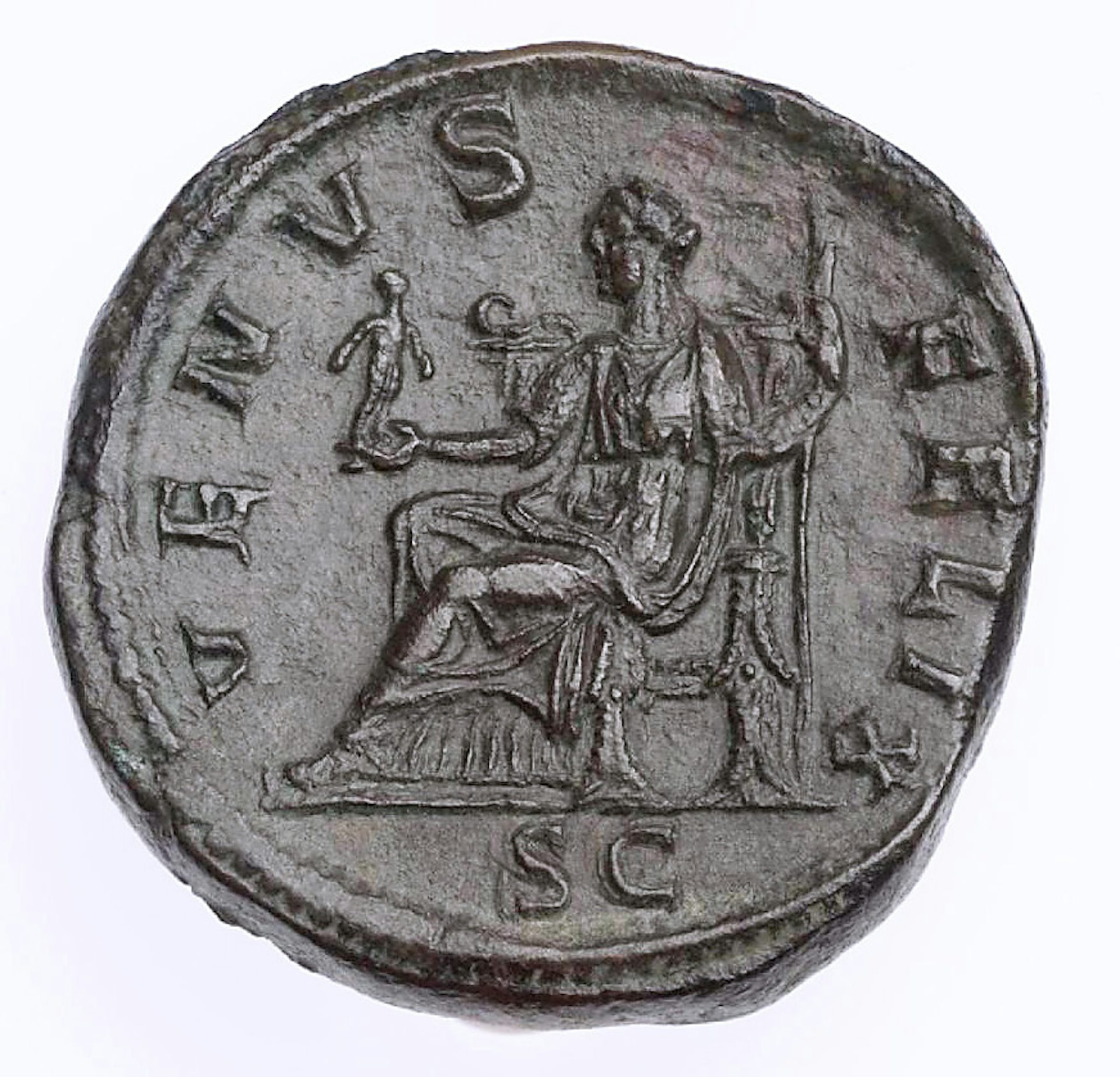
Venus Felix appears on the reverse of this bronze sestertius, minted sometime between 222 and 235 CE. In this depiction, Venus holds a scepter in one hand and Cupid in the other.
Museum of Fine Arts, BostonPublic DomainVenus was identified by a number of epithets, each indicating a distinct persona of the goddess. She was known as Venus Caelestis, or “Venus of the Heavens,” and Venus Erycina, or “Venus of Eryx,” her Carthaginian incarnation. She was called Venus Felix, the “Lucky Venus,” for her role in turning the tides of battle, as she did during the Second Punic War. She was also Venus Genetrix, or “Venus the Creator,” a title promoted by none other than Julius Caesar, based on the goddess’ role in the creation of the Roman state. In a more light-hearted vein, she was Venus Murcia, “Venus of the Myrtle,” and for being a loving protector of Rome, she was both Venus Obsequens, “Venus who Dotes,” and Venus Victrix, or “Venus who Brings Victory.”
Attributes
As the goddess of love and sex, Venus possessed the ability to make mortals and gods fall madly in love. Venus’ chief weapons were her charm and erotic appeal, and in her mythological tradition, many fell victim to them.
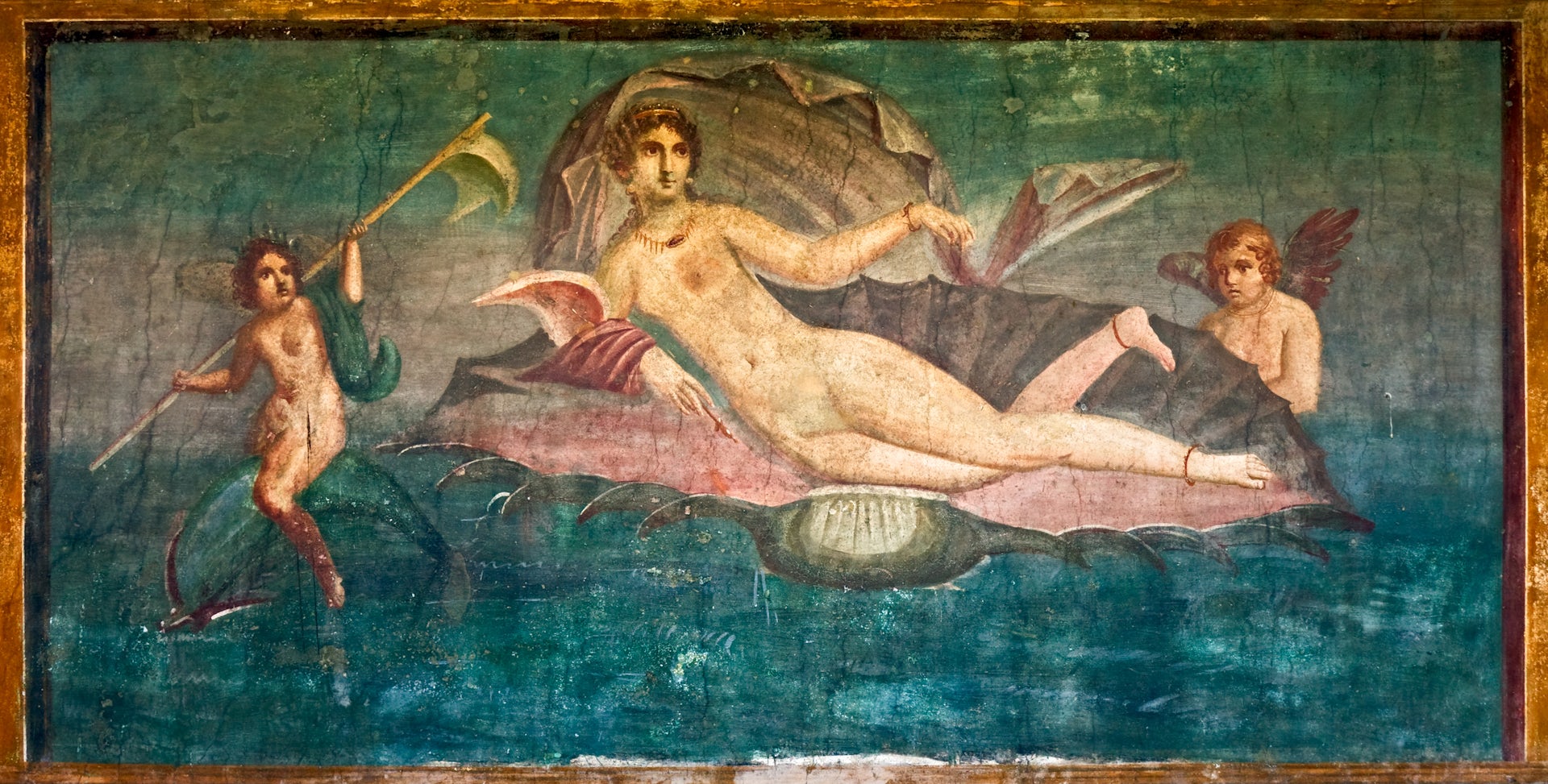
Venus in a sea shell, from a preserved fresco in ancient Pompeii.
rusm/iStock.comDepictions of Venus were often found in domestic settings. In many of her appearances, she was accompanied by symbols such as the rose—a symbol of fertility, sexual passion, and female genitalia. Additionally, she was often featured with a crown of myrtle (an evergreen brush with white flowers). This crown quickly became one of her chief symbols. Sea shells were another common motif; these shells served both as a reference to Venus’ birth at sea and as yet another of Venus’ many erotic symbols.
Family
Due to the unusual circumstances of her birth, Venus did not have parents in the traditional sense. Technically, Venus’ father was Uranus, the father of Saturn and grandfather of Jupiter. Her mother was the sea, which embodied the passive female principle in Roman thought.
In her maturity, Venus married Vulcan, the god of the kiln and master of metallurgy. Their marriage, fraught as it was with mistrust and infidelity, did not produce children. Venus’ frequent lover was Mars, the fiery and furious god of war, passion and anger. Venus’ children with Mars included Timor, the godly embodiment of fear, and the twins Concordia and Metus, goddess of harmony and god of terror, respectively. Venus and Mars also had a group of children known as the Cupids—winged creatures that symbolized love in all its forms.
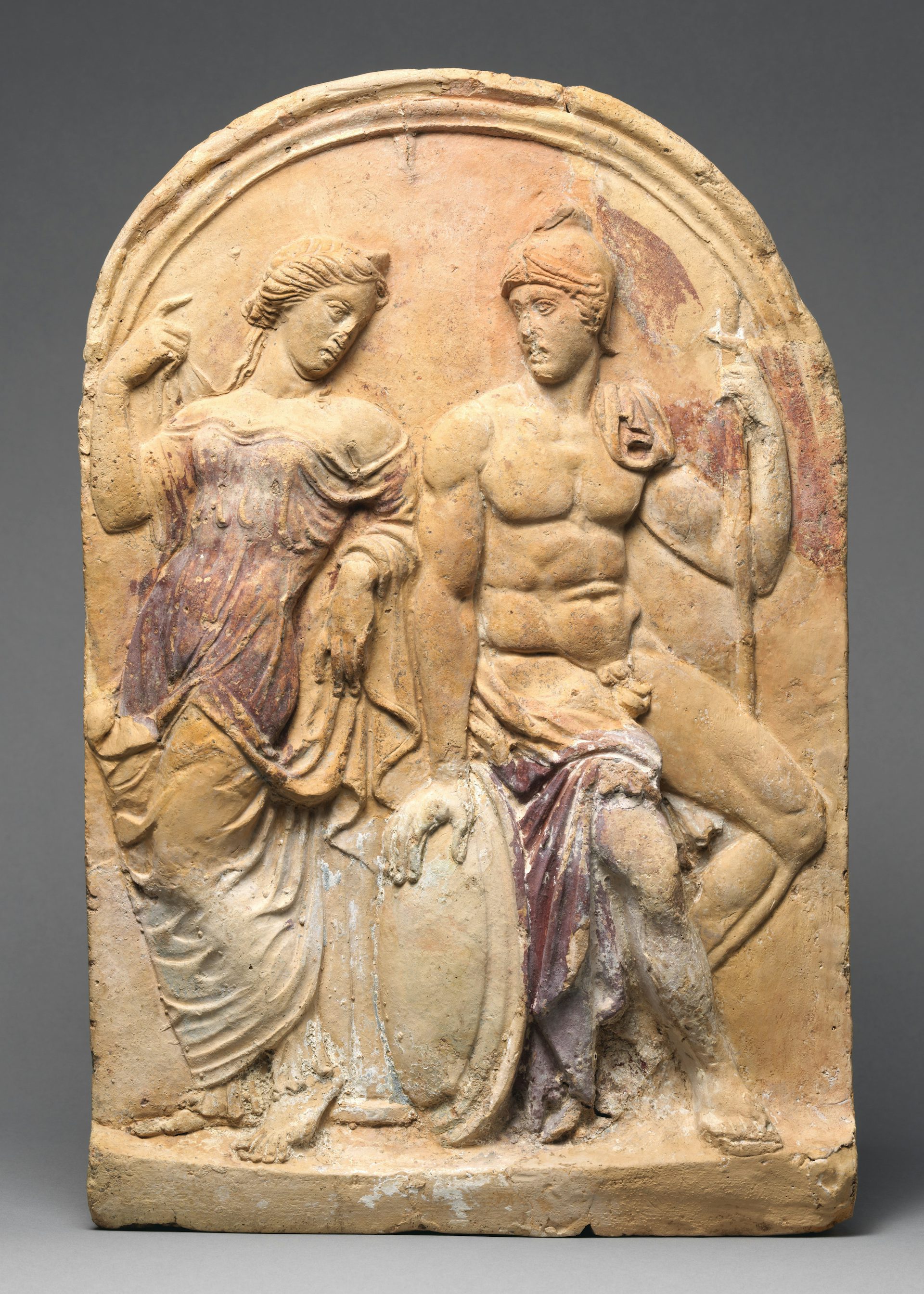
An ancient Roman ornamental tile depicting Venus and her lover, Mars.
The Metropolitan Museum of ArtPublic DomainWith Mercury, Venus had Hermaphroditos, an androgynous child with both male and female sex organs. With Anchises, Venus had a child of great import to Rome: the warrior hero Aeneas. According to Virgil, Aeneas established a royal lineage that included the gens (clan) of the Julii, the ancestors of Julius Caesar (it should be noted that Caesar’s adopted son Augustus was Virgil’s chief patron).
Family Tree
Mythology
Birth
Venus was created under rather unusual circumstances. Her father, Uranus, was the original ruler of the cosmos, and created the world with Terra, the “earth”. When Uranus’ son Saturn overthrew his father (a deed later repeated by Saturn’s own son), the usurper cut off his father’s genitals and cast them into the sea. There, the severed penis and testicles mixed with swirling sea foam and produced Venus. In art, this scene often took the form of Venus emerging from a clam or other mollusk.

The Birth of Venus (1485) by Sandro Botticelli. This tableau may be the best known representation of Venus emerging from the sea, an oft-depicted scene in ancient and neoclassical art.
Uffizi Gallery, Florence, Italy.Public DomainHusbands and Lovers
Though she was married to the blacksmith god Vulcan, Venus had a voracious sexual appetite that could not be satisfied by a single man. One famous tale showcased Venus’ infidelity as well as her unhappy marriage. Venus and Mars were sleeping together on a regular basis. During one of their many trysts, the messenger god Mercury discovered their affair. Always eager for cause mischief, Mercury informed Vulcan of the affair. Upon receiving this news, Vulcan immediately set to work in his workshop. Soon, he had crafted a net of material so fine that it was nearly undetectable; he draped this net over his marriage bed and waited. When Venus and Mars next sought to use the bed, they became ensnared by the net. Vulcan then assembled the gods to mock the naked lovers that had fallen into his trap.
In Ovid’s Metamorphoses, Venus carried on an affair with Adonis, a mortal male known for his unrivaled beauty. As the poet explained, Venus was nicked with the arrow of Cupid, one of her sons, while she bent to kiss the child. The wound went deep into her heart and caused her to fall in love with the mortal Adonis. The two were quite happy together:
She holds him, and is his companion, and though she is used to always idling in the shade, and, by cultivating it, enhancing her beauty, she roams mountain ridges, and forests, and thorny cliff-sides, her clothing caught up to the knee, like Diana.[1]
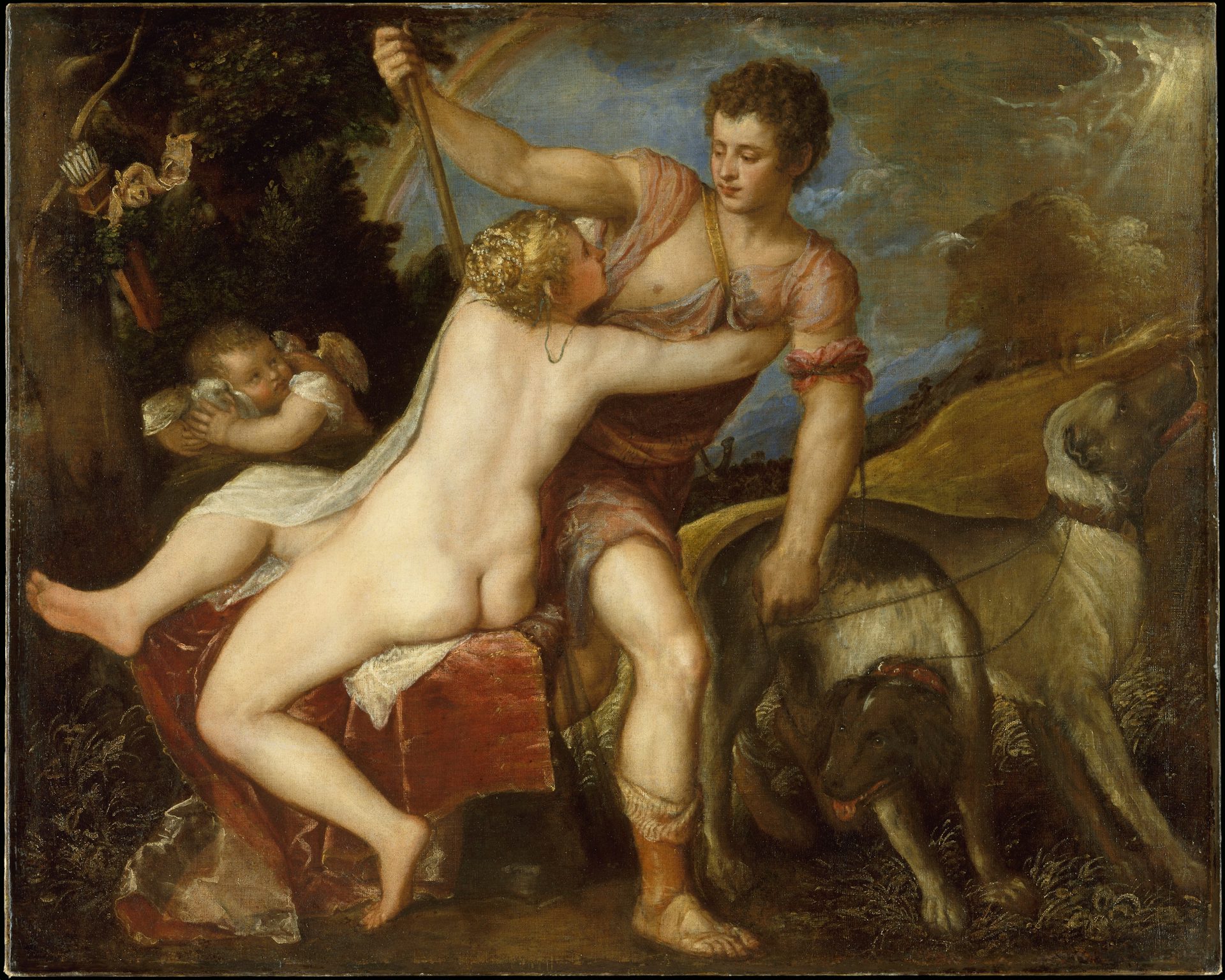
Venus and Adonis by the Italian painter Titian. In a scene taking inspiration from Ovid’s Metamorphoses, Venus attempts to prevent Adonis from going on an ill-fated hunt.
The Metropolitan Museum of ArtPublic DomainWith Adonis, Venus embraced a more rustic lifestyle, though she remained wary. She warned Adonis to avoid dangerous wild animals, claiming that “neither youth nor beauty, nor the charms that affect Venus, affect lions or bristling boars or the eyes and minds of other wild creatures.” But Adonis heeded not these wise words. He was out hunting boar when one of the tusked beasts suddenly gored him in the groin, killing him. When Venus saw what happened, she was overcome with grief:
When, from the heights, she saw the lifeless body, lying in its own blood, she leapt down, tearing her clothes, and tearing at her hair, as well, and beat at her breasts with fierce hands, complaining to the fates.[2]
Scooping up Adonis’ blood and mixing it with nectar, Venus crafted a red flower in her lover’s memory. Like Adonis, the flower was beautiful but short lived, as it lost its lovely petals within days of budding. The flower was known as the windflower, or anemone.
Venus, Aeneas, and the Aeneid
In the mythic tradition of Virgil’s Aeneid, Venus was cast as the lover of Anchises, a member of the royal family of Troy. According to this tradition, Venus disguised herself as a comely virgin and seduced Anchises, only revealing her true identity after she had become pregnant. She soon gave birth to Aeneas, who grew to be a mighty Trojan hero. Following the fall of Troy, Aeneas ventured into the Mediterranean to fulfill a prophecy that he would one day found a great Italian empire.
In the Aeneid, Venus served as a prime mover of events as well as a ceaseless advocate for her embattled child. Venus came to Aeneas’ aid after discovering that Juno had sent a massive storm to prevent his fleet from reaching Italy. Venus appealed to Jupiter, who interceded to quell the storm, before guiding her son safely to Carthage. Disguised as an old woman, she then guided Aeneas and his followers to the enchanting Queen Dido. As they made their way to the queen, Venus shielded her son’s party from unfriendly eyes:
But Venus shrouded them, as they went, with dusky air, and enveloped them, goddess as she was, in a thick mantle of cloud, that none might see or touch them, none delay or seek the cause of their coming.[3]
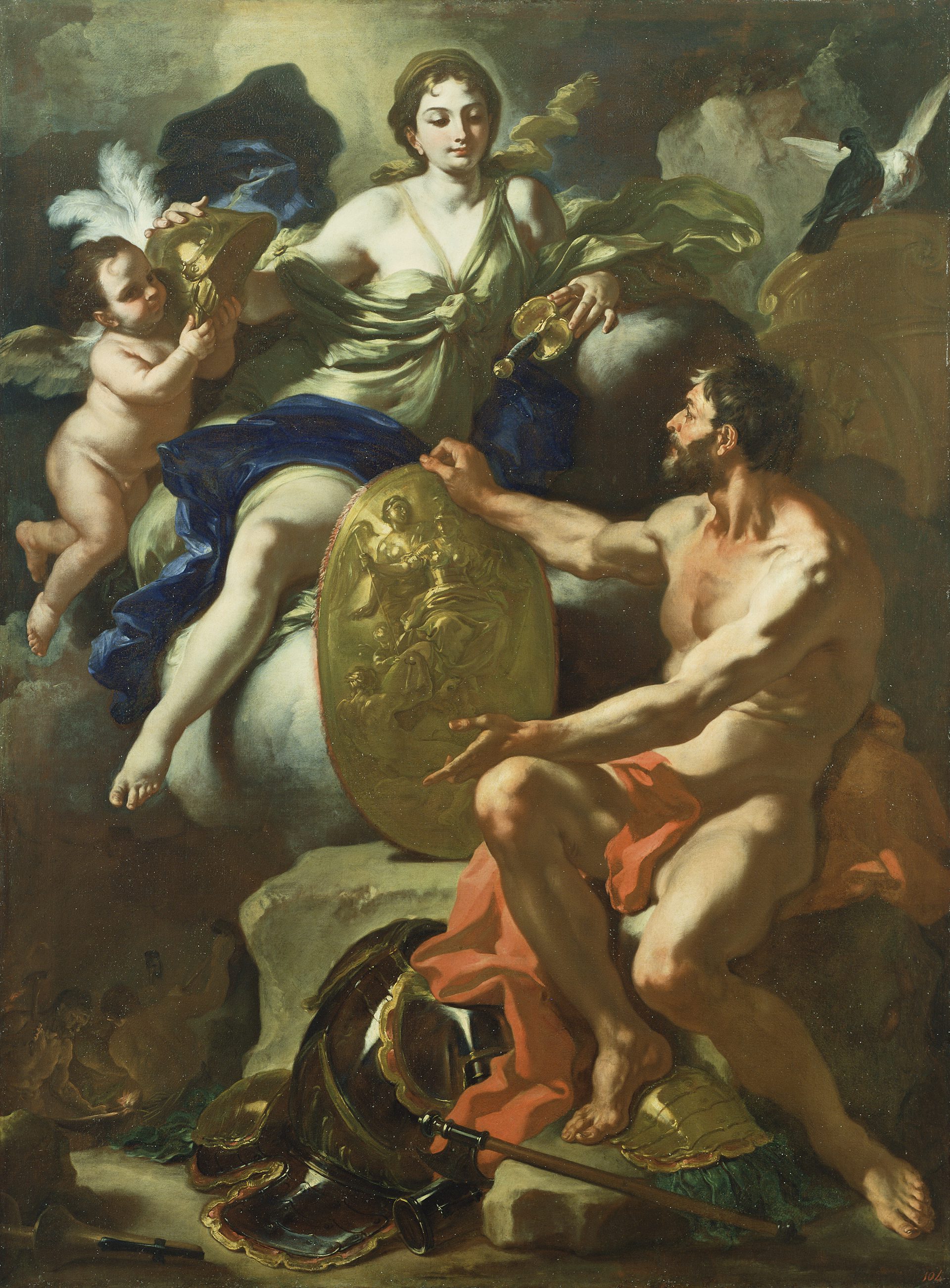
Venus at the Forge of Vulcan (1704) by Italian artist Francesco Solimena. In a sequence from Virgil’s Aeneid, Venus requests a shield and armor for her son Aeneas.
The Paul J. Getty Museum, Los AngelesPublic DomainLater, when Aeneas sailed from Carthage to Italy, Venus pleaded with Neptune to allow him safe passage across the Mediterranean. Neptune agreed on the grounds that the luckless captain, Palinurus, be sacrificed. Upon Aeneas’ arrival in Rome, Venus supplied him with weapons and armor that had been crafted by Vulcan. These weapons would be used in the coming war against the Latins. On Aeneas’ shield, Vulcan depicted the future triumphs of the Romans, such as Augustus’ victory over his foes at the battle of Actium in 31 BCE (as a contemporary and survivor of the bloody civil war that ended at Actium, Virgil had every reason to appease Augustus and present his triumph as a seminal moment in Roman history). Finally, in the penultimate moments of the Aeneid, Venus intervened and healed Aeneas after he had been struck by an arrow.
Venus and Roman State Religion
Venus was brought formally into the Roman state religion in the early third century BCE, when the consul Quintus Fabius Gurgus dedicated a temple to Venus Obsequens, or “Venus the Doter.” During the Second Punic War in the late third century BCE, Romans appealed to Venus—who, at that time, was recognized as a patron of Carthage—for assistance. They asked her to switch sides, and even sacked Eryx, a Carthaginian stronghold that held one of her temples, in an effort to curry favor. The Romans seized a holy relic from the temple and took it back to Rome, where it was held in the Temple of Venus Obsequens. The intercession of Venus was thought to turn the tide of the war in favor of the Romans.
In the first century BCE, Julius Caesar claimed to be an actual descendant of Venus via the clan she established through Aeneas; this claim was later substantiated by the poet Virgil, who presented Venus as the founder of the Julius family. Caesar had political motives, as did his rival Pompey, who also claimed to be favored by Venus. Caesar later established a temple in honor of Venus Genetrix, or “Venus the Creator.”

Ruins of the Temple of Venus Genetrix completed in 46BCE. Claiming descent from Venus and her son Aeneas, Julius Caesar commissioned the construction of the temple to commemorate his victories over Pompey. Forum of Caesar, Rome, Italy.
Carole RaddatoCC BY-SA 2.0The Romans held three festivals in honor of Venus each year. Held on April 1, Veneralia was dedicated to Venus Verticordia, or “Venus who Changes Hearts.” Vinalia Urbana, held on April 23, was a wine festival shared with Jupiter at which prostitutes assembled before the Temple of Venus, offering myrtle and mint and receiving blessings in return. Held on August 19, the Vinalia Rustica was yet another wine festival and celebration of fertility at which pious worshipers of Venus offered a female lamb for sacrifice.
Pop Culture
Venus has remained relevant in modern pop culture, and is culture as a symbol of love and eroticism. Thanks to her associations with beauty and sexuality, Venus has been appropriated by several notable cosmetics brands. One such company, Gillette, created a line of women’s shaving products bearing the goddess’ name. Another company, Venus Skin Care, also used the goddess’ name as a marketing tactic.
Venus’ name has been used in a number of movie titles as well. A French film, Venus (1984), centered on the adventures of two American businessmen as they journeyed in search of a model for their cosmetics line (called, of course, “Venus”). Three other films have used the title Venus. One of these more recent films focused on the life of a transgendered woman who opens up about her sexual identity.
Venus has also appeared in songs, including Miles’ Davis 1957 release, “Venus de Milo,” and the 1969 hit by Shocking Blue “Venus”. The latter song famously featured the lyrics: “Well, I’m your Venus/I’m your fire/At your desire.” Lady Gaga’s 2013 song “Venus” directly invoked the goddess and her ability to inspire irrepressible sexuality: “I can’t help the way I’m feeling/Goddess of love, please take me to your leader/I can’t help, I keep on dancing/Goddess of Love! Goddess of love.”
Finally, Venus also lent her name to the second planet from the sun. Befitting its namesake, Venus is the brightest planet in the solar system.